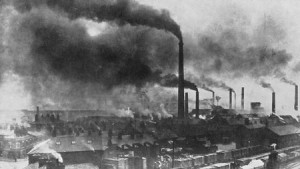Urban waste and pollution history: a Bibliography
Cities can be regarded as artificial environments created for the benefit of humans, and yet none of this liberates people from nature. Cities have to be fed and provided with energy and water in order to exist and sustain its human population. The bigger the city, the more resources and energy must be extracted from the surrounding areas to sustain it.

Air pollution in the English town of
Widnes in the late 19th century.
Source: Wikimedia Commons
This on the other hand creates another problem: environmental pollution. Peoples in cities are washing clothes, dishes, and go to the toilet. The waste produced in this way is flushed into water courses polluting it and making it unsuitable for human consumption or organisms to live in. Preparing food also creates waste, which ends often in landfills or is incinerated. Cars, fires to heat our homes and stoves to cook on pollute the air because of the use of wood, coal or gas, causing smog. The worst smog in Britain was the famous London smog of December 1952 in which about 3000 people died. However, the pollution mentioned above is mainly caused by domestic activities and transport. Industrial pollution is probably an even more serious problem leading to potentially poisoning the air, water and soil.
With the growth of cities and industrialisation urban waste and pollution are an important part of history. From the rise of the first urban settlements until the emergence of mega cities in the 20th century, the scale and intensity of pollution has increased. The bibliography below presents an introductory reading list on the topic of urban waste and pollution history.
Some useful links:
- The History of Sanitary Sewers
- Timeline of waste, University of St. Andrews
- London’s ‘Great Stink’ and Victorian Urban Planning by Martin Daunton, BBC History.
Bowler, Catherine and Peter Brimblecombe, “Control of Air Pollution in Manchester prior to the Public Health Act, 1875”, Environment and History, 6 (2000), 71-98
Brimblecombe, Peter, The Big Smoke: a history of air pollution in London since medieval times (London: Methuen, 1987)
Brimblecombe, P., “History of air pollution”, in: H. B. Singh (ed.), Composition Chemistry and Climate of the Atmosphere (New York: VNR publishers, 1995), pp. 1-18.
Brimblecombe, P., “The Globalization of Local Air Pollution”, Globalizations, 2 (December 2005), 429-442.
Cain, Louis P., “An Economic History of Urban Location and Sanitation”, Research in Economic History, 2 (1977), 337-389.
Elkind, Sarah S., Bay Cities and Water Politics: The Battle for Resources in Boston and Oakland(Lawrence: University Press of Kansas, 1998).
Gandy, Matthew., Recycling and the Politics of Urban Waste (London: Earthscan Publications, 1994).
Goldman, Joanne Abel., Building New York’s Sewers: Developing Mechanisms of Urban Management(West Lafayette, Ind.: Purdue University Press, 1997).
Halliday, Stephen, The Great Stink of London. Sir Joseph Bazalgette and the Cleansing of the Victorian Metropolis (Stroud: Sutton Publishing, 2001).
Hanley, Susan B, “Urban Sanitation in Preindustrial Japan”, in: Robert I. Rotberg (ed.), Health and Disease in Human History: A Journal of Interdisciplinary History Reader, (Cambridge, Mass.: MIT Press, 2000), pp. 141-166.
Hoy, Suellen, Chasing Dirt: The American Pursuit of Cleanliness (New York: Oxford University Press, 1995).
Keeling, Arn: “Sink or Swim: Water Pollution and Environmental Politics in Vancouver, 1889-1975”, BC Studies,Summer/Autumn 2004, pp. 69-101.
Kidder, Robert. “Disasters Chronic and Acute: Issues in the Study of Environmental Pollution in Urban Japan”, in: Pradyumna P. Karan and Kristin E. Stapleton (eds.), The Japanese City (Lexington: University Press of Kentucky, 1997), pp. 156-175
Melosi, Martin V. (ed.), Pollution & Reform in American Cities, 1870-1930 (Austin: University of Texas Press, 1980).
Melosi, Martin V., Garbage in the Cities: Refuse, Reform and the Environment, 1880-1980 (College Station: Texas A&M University Press, 1981).
Melosi, Martin V. (ed.), The Sanitary City: Urban Infrastructure in America from Colonial Times to the Present (Baltimore: Johns Hopkins University Press, 2000).
Mosley, Stephen, The chimney of the world: a history of smoke pollution in Victorian and Edwardian Manchester (Cambridge: White Horse Press, 2001)
Olsson, Göran. “The Struggle for a Cleaner Urban Environment: Water Pollution in Malmö 1850-1911”,Ambio, 30 (August, 2001) 287-291
Schott, Dieter. “The Formation of an Urban Industrial Policy to Counter Pollution in German Cities (1890-1914)”, in: Christoph Bernhardt and Geneviève Massard-Guilbaud, Le Démon Moderne: La pollution dans le sociétés urbaines et industrielles d’Europe (Clermont-Ferrand: Presses Universitaires Blaise-Pascal, 2002), pp. 311-332
Tarr, Joel A., “Industrial Waste Disposal in the United States as a Historical Problem”, Ambix: The Journal of the Society for the History of Alchemy and Chemistry, 49 (Mar. 2002) 4-20.
Tarr, Joel A., The Search for the Ultimate Sink: Urban Pollution in Historical Perspective (Akron, Oh.: University of Akron Press, 1996)
Tarr, Joel A., “Searching for a ‘Sink’ for an Industrial Waste: Iron-Making Fuels and the Environment”,Environmental History Review, 18 (Spring, 1994) 9-34.
Tarr, Joel A., and Gabriel Dupuy (eds.), Technology and the Rise of the Networked City in Europe and America (Philadelphia: Temple University Press, 1988).
Tarr, Joel A., “Industrial Wastes and Public Health: Some Historical Notes, Part 1, 1876-1932”, American Journal of Public Health, 75 (September 1985) 1059-1067.
Tarr, Joel A., “Water and Wastes: A Retrospective Assessment of Wastewater Technology in the U. S., 1800-1932”, Technology and Culture, 25 (April, 1984) 226-263, with J. McCurley F.C. McMichael, and T.F. Yosie.
Tarr, Joel A., “Historical Decisions About Wastewater Technology, 1800-1932”, Journal of Water Resources Planning and Management, 103 (May, 1977) 47-61, with F.C. McMichael.
TeBrake, William H., “Air Pollution and Fuel Crises in Pre- Industrial London, 1250-1650”, Technology and Culture, 16 (July, 1975), 337-359.
Recent Comments